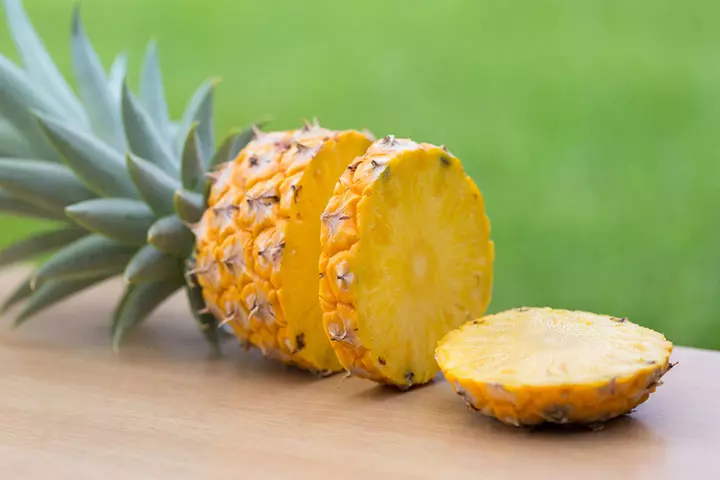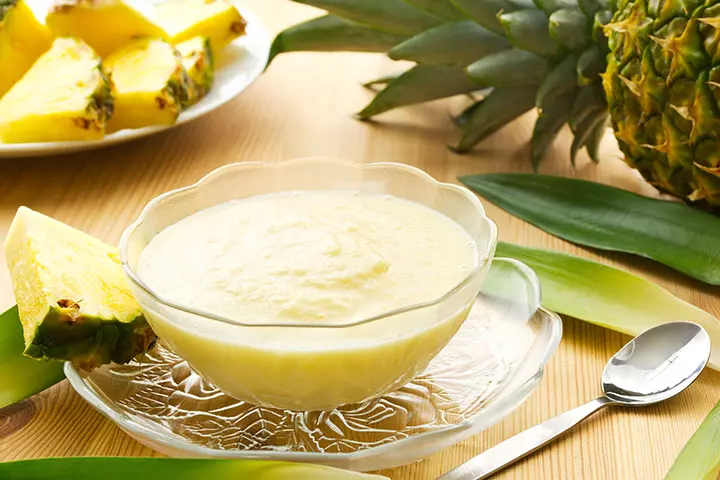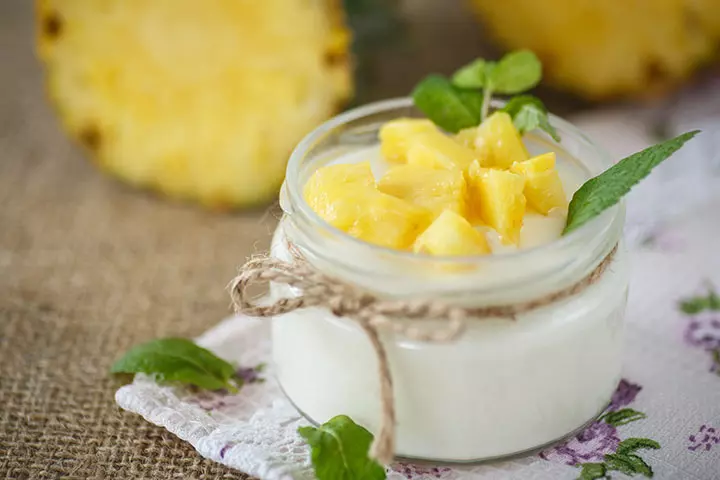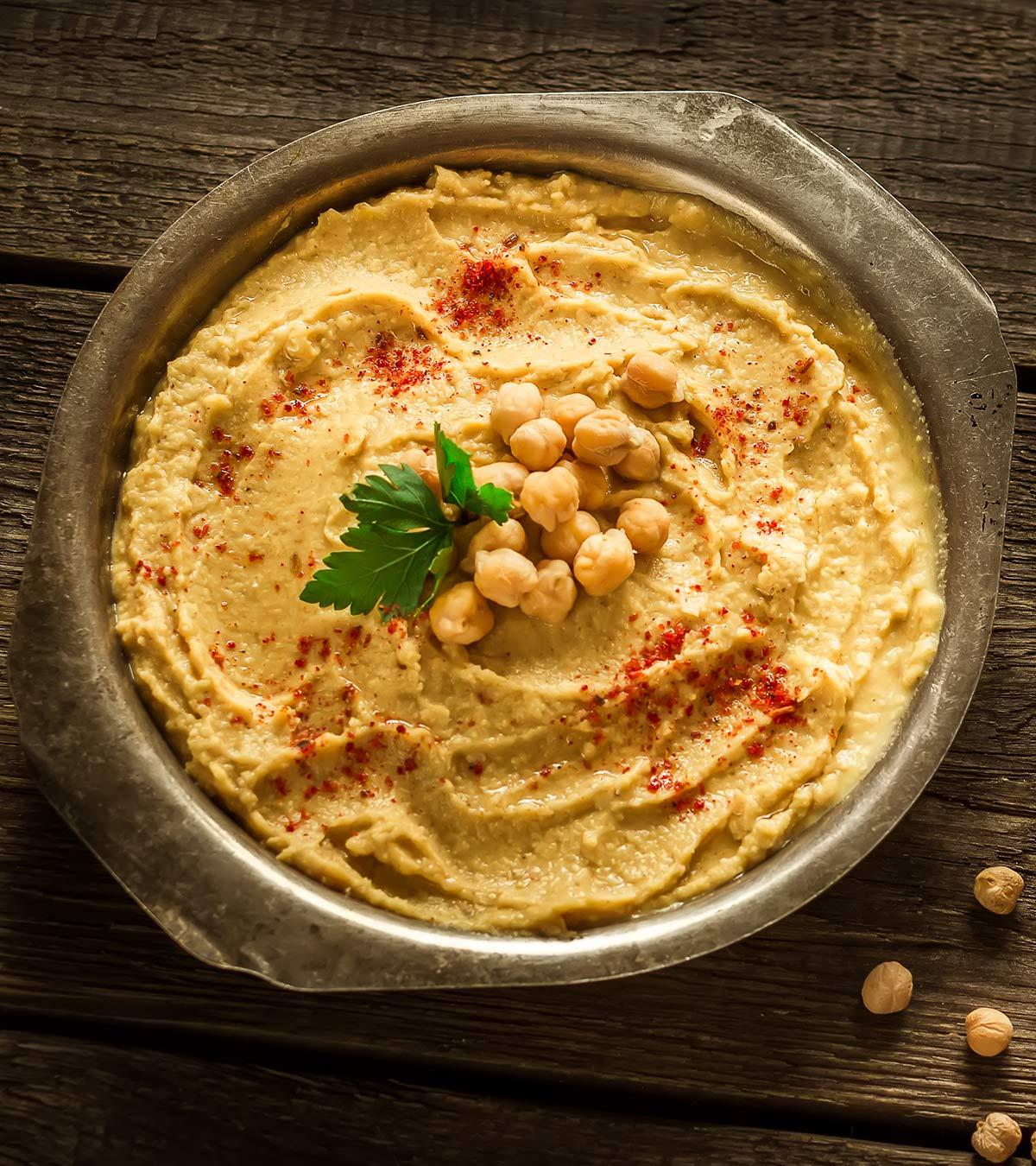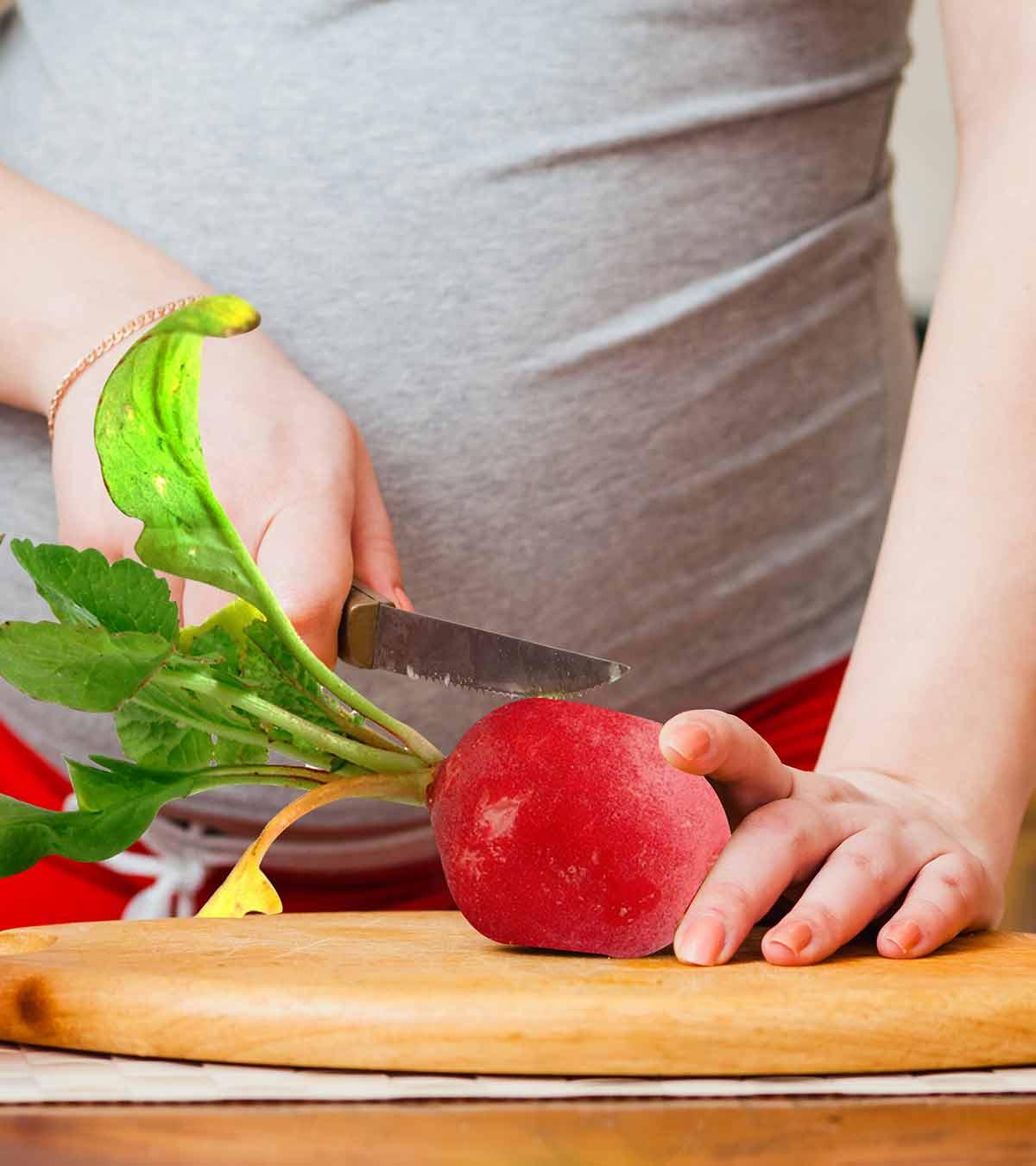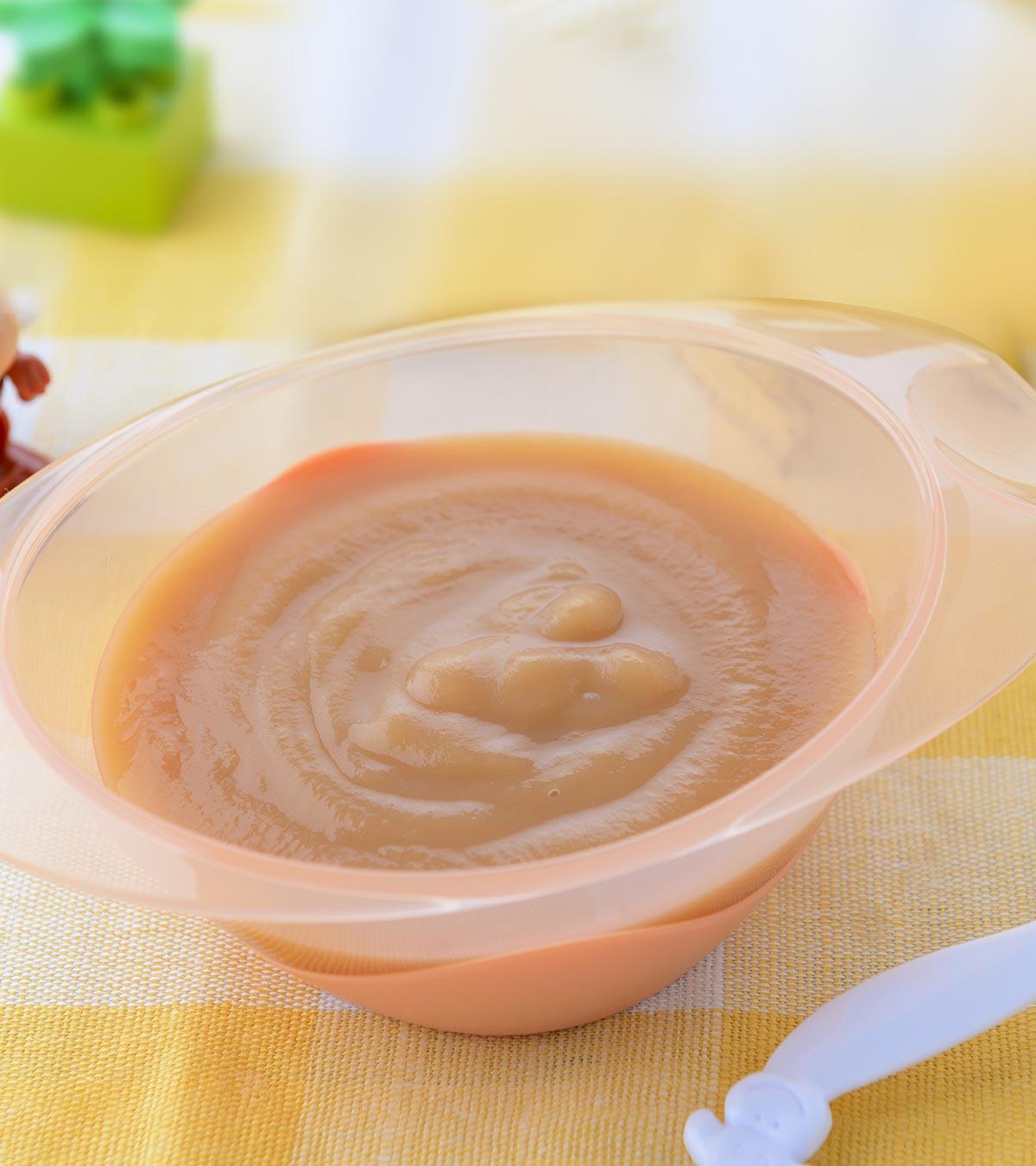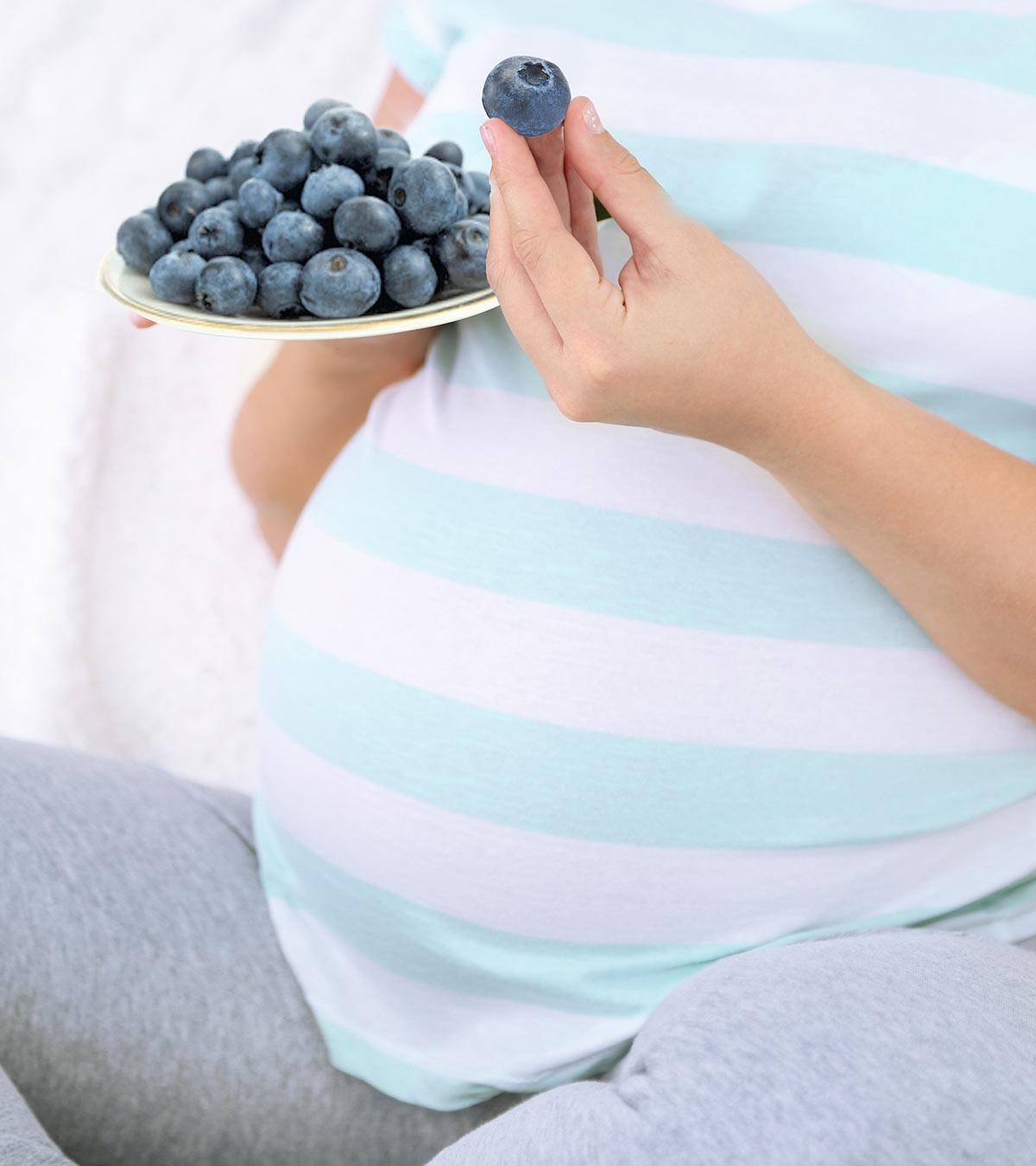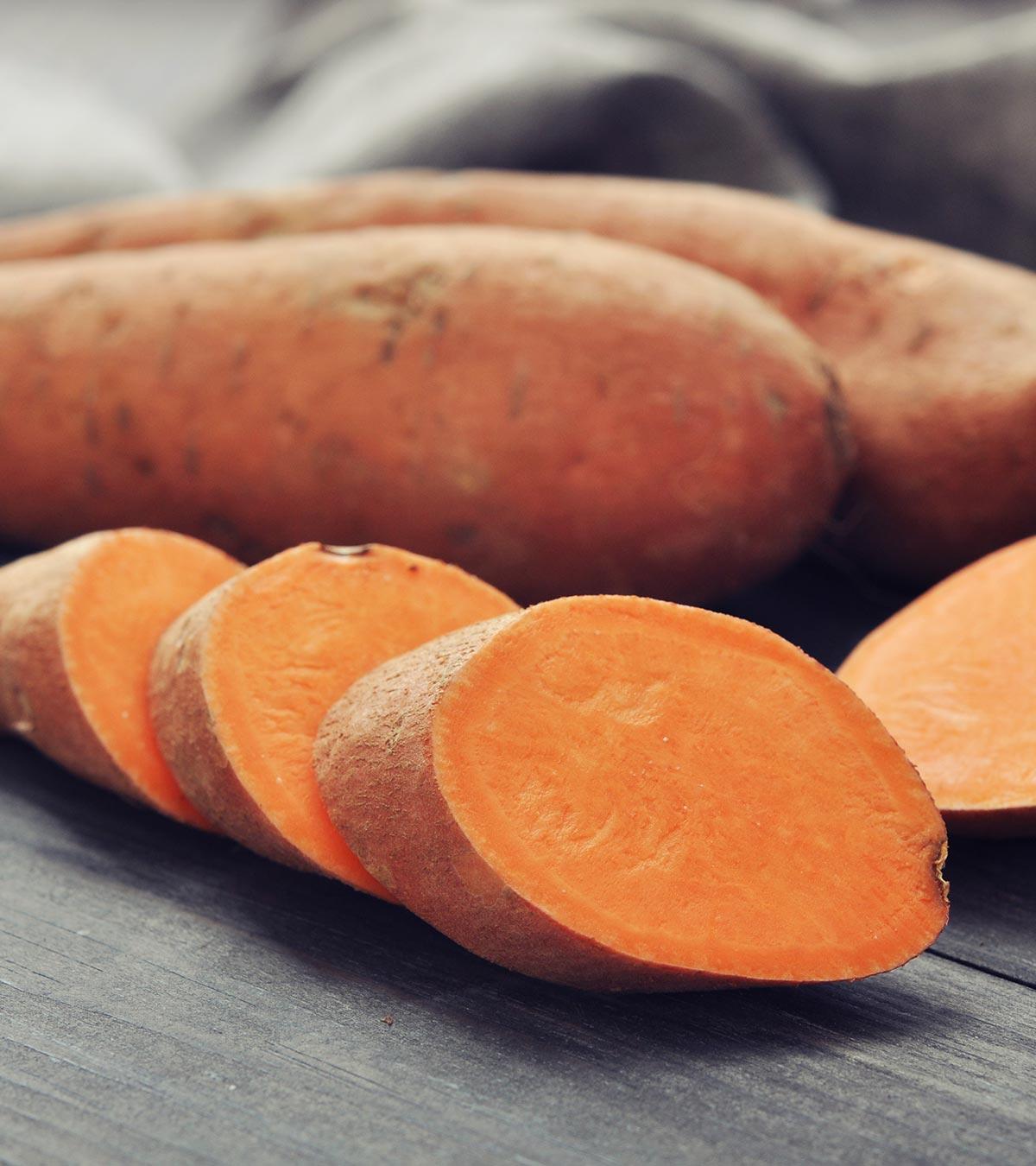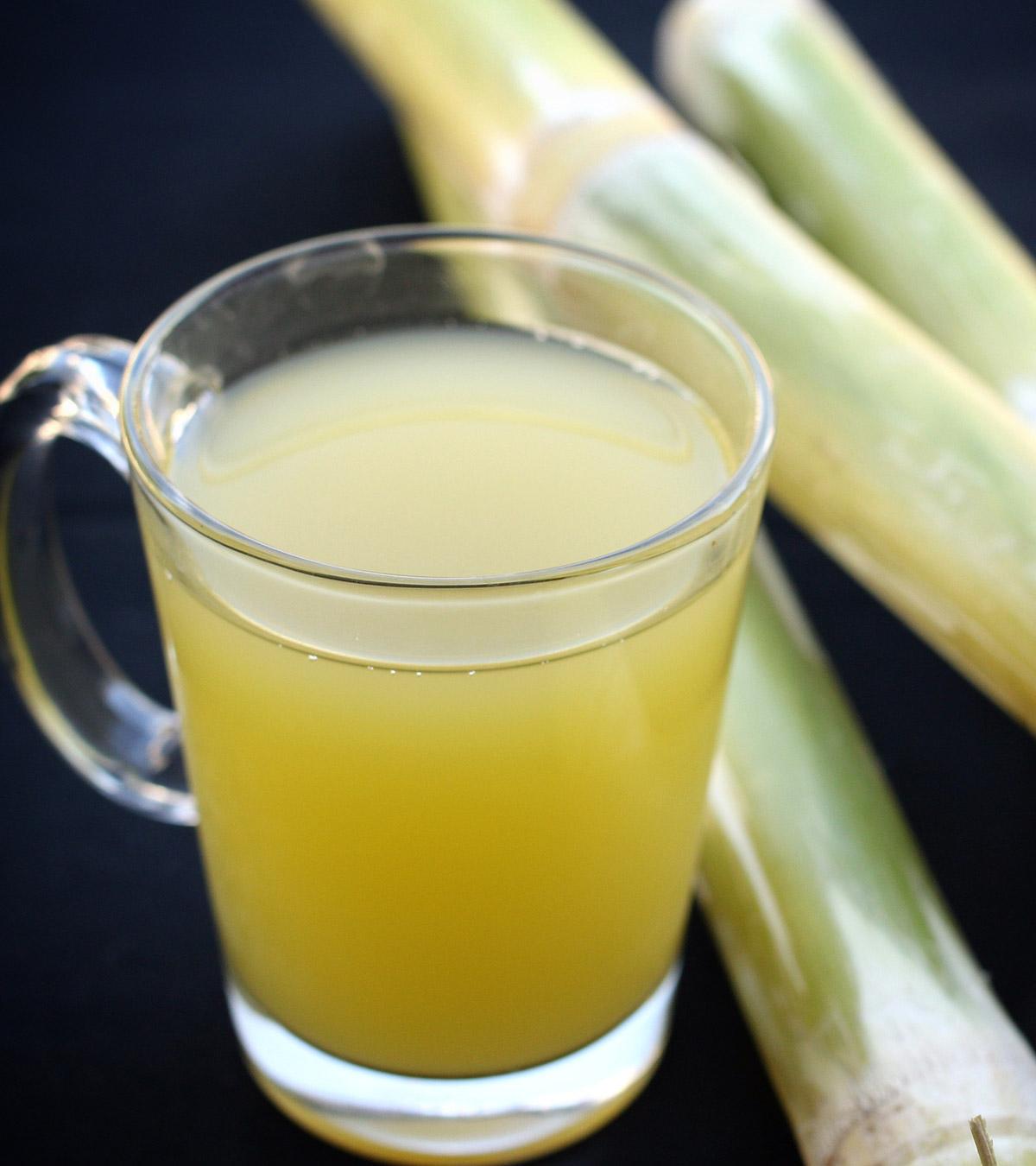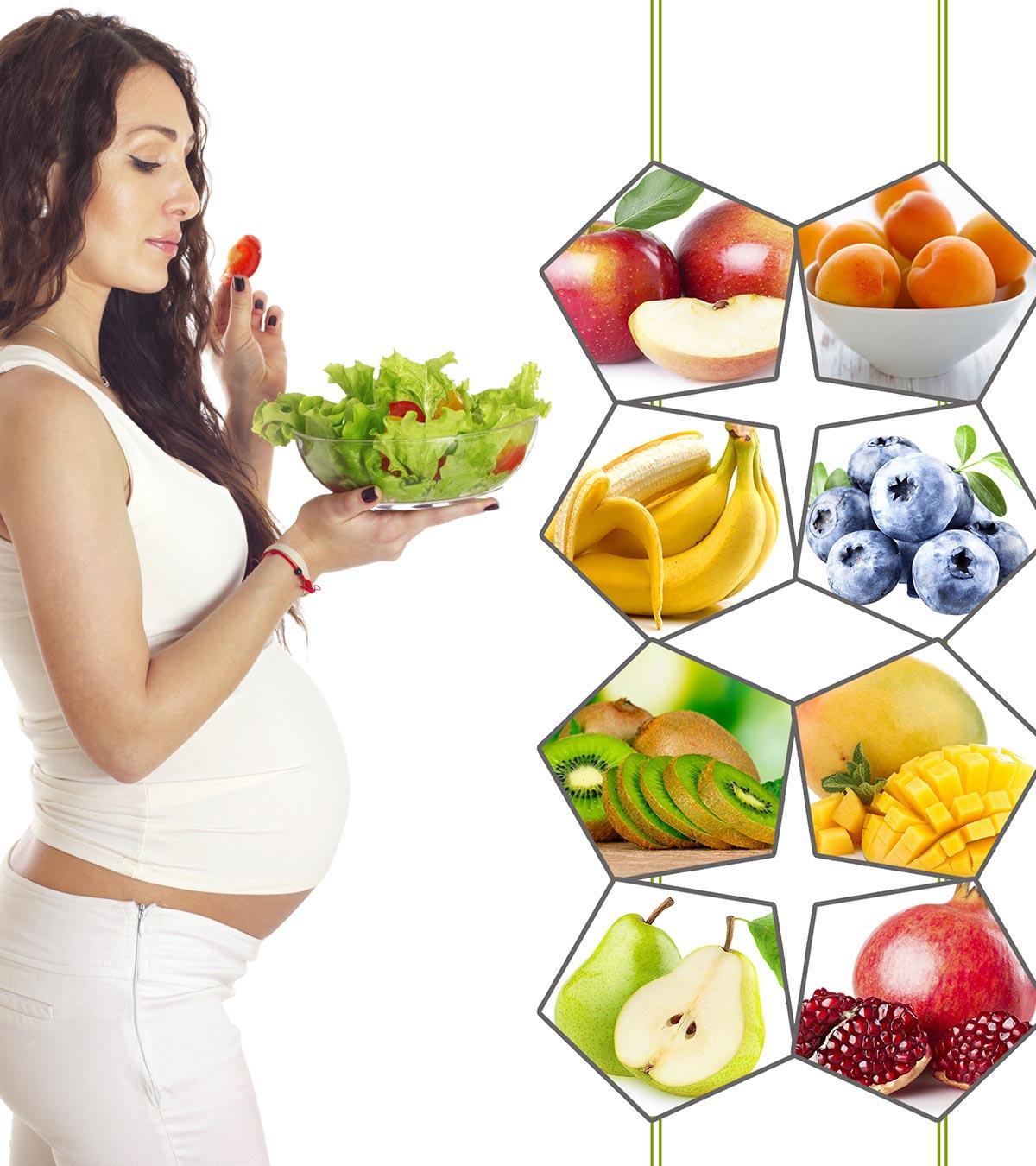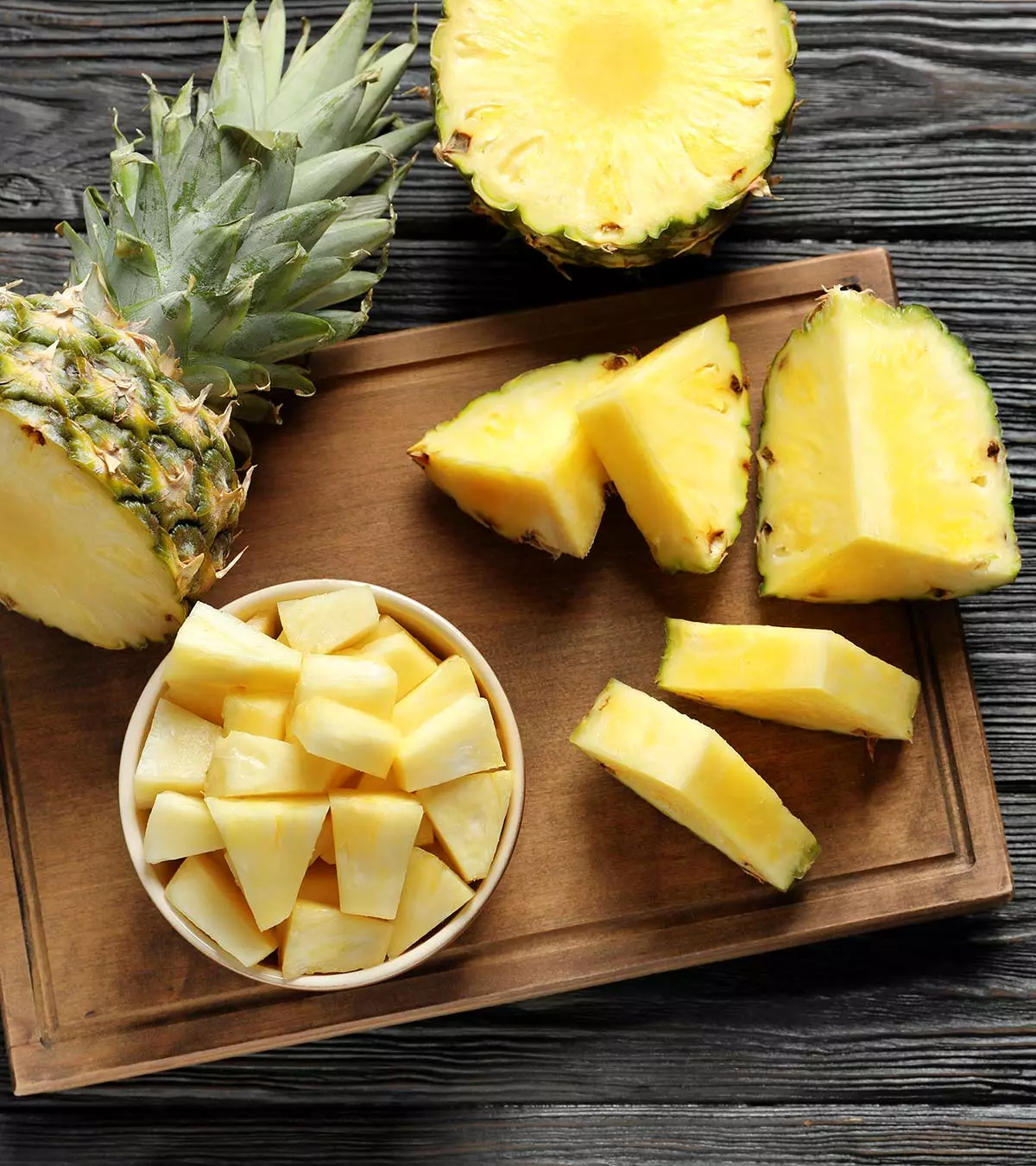
Pineapple is a versatile fruit that can be incorporated into savory dishes and delectable desserts. If their babies already eat solids and other fruits, parents may consider incorporating this fruit in their diet, considering the benefits of pineapple for babies. But is pineapple safe for infants? Can it cause allergic reactions? Is there a right age to introduce pineapples to your baby’s diet?
Continue reading this post, where we offer some essential information about the safety, benefits, risks, and precautions to take while offering pineapples to babies.
Is It Safe For Babies To Eat Pineapple?
Yes. Pineapple is safe for babies. However, pineapple allergy due to cross-reactivity is often observed. Therefore, it is wise to practice caution and consult a pediatrician before including.
When Can Babies Have Pineapple?
The American Academy of Pediatrics recommends “the introduction of solid foods between the ages of four and six months” (1). So, as your baby starts solids, pineapple can as well be included in the diet.
Many parents might deter from including pineapple in their baby’s diet due to the fear of allergies. But it is not needed unless your baby has shown signs of allergy previously. Extending exclusive breastfeeding and delaying feeding solids is quite unlikely to prevent allergies in babies.
Nutritional Value Of Pineapple
Pineapple is considered an essential tropical fruit in the world (2). It is rich in micronutrients, phytochemicals, and bioactive compounds such as bromelain, making it a valuable addition to a healthy diet and good nutrition. (3).
100grams of fresh, raw pineapple provides the following nutrients. Corresponding to nutrients are the recommended amounts of nutrients (RDA) for babies on a per day basis.
| Name | Amount | RDA (per day) |
|---|---|---|
| Water | 86g | – |
| Energy | 50Kcal | – |
| Fiber, total dietary | 1.4g | – |
| Sugars, total including NLEA | 9.85g | – |
| Calcium, Ca | 13mg | 270mg (7-12 months) |
| Magnesium, Mg | 12mg | 75mg (7-12 months) |
| Phosphorus, P | 8mg | 275mg (7-12 months) |
| Potassium, K | 109mg | 700mg (7-12 months) |
| Vitamin C, total ascorbic acid | 47.8mg | 20mg (7-12 months) |
| Folate, total | 18µg | 32µg (7-12 months) |
Sources
: U.S. Department of Agriculture (4) and World Health Organization (5)
Health Benefits Of Pineapple For Babies
Besides food, pineapple is also used as a medicinal plant in traditional medicine. Most of the therapeutic properties of fresh pineapple are attributed to bromelain, a complex mixture of protease (which helps with protein metabolism, or essentially a meat tenderizer). Bromelain is found in pineapple fruit and its stem (6).
Below are some health benefits that your baby could reap by regular consumption of pineapple (100 grams) with a well-balanced diet (6) (3) (7).
- Hydration: 100 grams of pineapple has 85 grams of water. It makes pineapple a juicy fruit that could help fight dehydration. It refreshes the body and also provides micronutrients, which are crucial for maintaining various physiological reactions.
- Regular bowel movement: Besides water, pineapple has a considerable amount of fiber and could support regular bowel movements. It is an important mechanism to keep constipation at bay.
- Healthy heart: Pineapple contains bromelain that has been attributed to the cardioprotective benefits when consumed regularly. Mainly, bromelain found in pineapple reduces blood clotting and helps remove plaque from arterial walls.
- Pain relief: Bromelain present in pineapple is believed to have analgesic properties that could help in providing relief from pain.
- Control inflammation: Bromelain has been recommended as complementary medicine in the treatment of chronic inflammation and auto-immune diseases. Its anti-inflammatory property has also been demonstrated in conditions like sinusitis, sore throat, and other upper respiratory infections.
 Quick fact
Quick fact- Subside infections: Research studies show that bromelain found in pineapple could fight-off some of the effects of certain intestinal pathogens such as E.coli. It helps control diarrhea, which often occurs due to the enterotoxicity of pathogens (8). Bromelain may help enhance the immune system, making it a potentially valuable supplement for overall health and wellness.
- Might remove intestinal worms: As per folk medicine literature, pineapple juice is believed to clear intestinal worms. A research study among birds noted the anthelmintic property of pineapple juice (9). However, no research studies on humans were found in this regard.
- Potential antioxidant: Pineapple has a considerable amount of vitamin C and bromelain that possess antioxidant properties. The availability of potent antioxidants in the body supports immunity and reduces free radical damage.
Apart from bromelain and vitamin C, pineapple also contains good amounts of magnesium and potassium that help in the growth and development of the bones and nervous system.
 Did you know?
Did you know?Potentials Risks Of Pineapple For Babies
Like any other food item, pineapple also has some potential health risks that are worth knowing (7).
- Toxicity: Raw pineapple is not only considered inedible but is actually poisonous. On consumption, it acts as a throat irritant and drastic purgative. Thus, its use must be avoided for babies to reduce risks of health implications.
- Bezoars: It is the indigestible material that accumulates in your digestive tract, sometimes causing a blockage. This can happen with any fiber, not necessarily with pineapple.
- Oral allergy syndrome: Oral allergy syndrome (OAS) is caused by cross-reactivity between specific proteins found in fresh fruits, vegetables, and nuts with pollens (10). Clinical evidence exists for cross-reactivity of bromelain and papain (11) (12) and cross-reactivity of pineapple with banana, latex, or birch pollen (13).
Note: Your baby is at an increased risk of pineapple allergy if a close relative such as parents, siblings, or grandparents are allergic to pineapple.
Precautions While Introducing Pineapple To Babies
Pineapple is very perishable. Therefore, it is important to take precautions while selecting, storing, and consuming it. Below are some steps that could be helpful (3) (14).
- Buy only fresh and organic pineapple.
- Do not buy a pineapple if the crown leaves look dry or brown, outer skin appears dull and yellow, there is visible mold on the surface, and the fruit looks too tender on touch.
- Pineapple can be stored at room temperature for two to three days. This will make the fruit softer and juicier.
- If the weather is hot, then the entire uncut fruit should be refrigerated at 10-13 degrees Celsius. Do not mist or ice the pineapple since the fruit is sensitive to chilling.
- Check for the right temperature for storage, if you are buying fresh-cut and packed pineapples from the market. They have a decent shelf-life of at least seven days at the right temperature.
- For canned pineapple, check the label carefully for ingredients, manufacturing, and expiry date.
- Check the can carefully for possible damage. If you find the can to be dented or puffed, then do not buy it as the product safety is possibly compromised.
 Quick tip
Quick tipWays To Include Pineapple In Baby’s Diet
Pineapples can make great baby food for a baby’s introduction to solids. Pineapple is available in fresh, canned, and frozen forms, making it a versatile fruit for babies during the weaning period. You can pick either of them to prepare a dish for your baby. However, using fresh pineapple instead of other alternatives like canned or frozen pineapple is always good.
Pineapple Recipes For Babies
Below are some nutritionally sumptuous ways in which you can introduce pineapple to your baby as a part of their diet.
For Babies 4-6 months
For babies under six months of age, exclusive breastfeeding is recommended. However, some babies do show readiness toward solid food and spoon-feeding at the age of four months. As you intend to introduce pineapple, a pineapple puree is the simplest recipe to try. Once the baby seems comfortable, then you can try mixing pineapple with other foods. Find below the recipe for making Pineapple puree and Pineapple Yogurt.
Pineapple Puree
Image: Shutterstock
Pineapple puree is perfect for introducing your baby to its sweet and tropical flavor. It is smooth and can be easily spooned or offered as finger food for babies as a part of their weaning diet.
You will need:
- 1 cup chopped fresh pineapple
- 2 tbsp water, breast milk or formula
How To:
- Put the pineapple in a blender.
- Blend until it’s very smooth, and add a bit of liquid (water, breastmilk, or formula) if necessary. Ensure that it’s free of lumps.
- You can serve it immediately, store it in the fridge in an airtight container for three to five days, or freeze it for later use.
Pineapple yogurt
This recipe is a soft blend of yogurt and pineapple, thus making this easy-to-digest preparation rich in protein and micronutrients essential for a baby.
You will need:
- 1 pineapple ring
- 1 cup plain unsweetened yogurt
How To:
- Take the pineapple ring and dice it into pieces. Ensure that the utensils used are clean and sterilized.
- Put the pineapple pieces into a blender and add yogurt.
- Blend the mixture until you get a smooth paste. Ensure no lumps are formed.
- Take the mixture out in a small bowl. Sprinkle some cinnamon over it and serve it.
For Babies 7-9 months
By seven to nine months of age, a baby should be eating all the foods from various food groups. So this is the time when you can also broaden your options and serve more interesting dishes and snacks for your baby. Try this finger food recipe for your baby that is raved by many mothers.
Pineapple and cream cheese sandwiches
This recipe also has a blend of high-protein cheese with natural pineapple to ensure that your baby gets all that is needed to eat nutritiously.
You will need:
- 2 whole-grain bread slices
- 1 8oz. (226gm) pack of cream cheese
- 1 cup crushed pineapple
- 4 cups brown sugar
- ½ cup toasted walnuts and almonds (thinly sliced) – optional
How to:
- To start, take a clean bowl and put cream cheese in it.
- Add mashed pineapple to the cream cheese, and blend them together well.
- Once the blend is ready, add brown sugar and sliced nuts into it.
- Mix everything well and keep it aside.
- Take a bread slice and lay it on a flat board, and remove the edges of the bread.
- Now cut four squares out of the slice and spread the cream cheese mix over those pieces.
- Pack those slices as sandwiches and wrap them well in a plastic wrap. Refrigerate for 30 minutes.
- Serve with a fresh homemade sauce.
Pineapple Coconut Muffins
Image: Shutterstock
These muffins provide an excellent finger food option for babies above six months. It seamlessly blends the goodness of pineapple with the rich flavor of coconut.
You will need:
- 1 cup rolled oats
- 1 medium ripe banana
- ¾ cup of whole-fat plain Greek yogurt
- 1 egg
- 1 tsp vanilla extract
- 1 ½ tsp baking powder
- ¾ cup finely chopped pineapple
- ⅓ cup unsweetened shredded coconut
How To:
- Preheat the oven to 350 degrees Fahrenheit.
- In the blender or food processor, begin by placing the oats, followed by the remaining ingredients, excluding the pineapple and coconut.
- Blend until smooth, then mix in the pineapple and coconut.
- Pour the batter evenly into a greased or lined 12-cup muffin pan. Sprinkle coconut on top (optional).
- Bake for 25-30 minutes or until a toothpick inserted comes out clean.
- Let the muffins cool entirely before taking them out of the pan.
Above 12 months, babies can try almost any recipe made from pineapple. If you want to try pineapple juice for your baby, this would be the right time to do so. However, feed only small quantities of juice with no added sugars to your baby. The American Academy of Pediatrics recommends limited intake of juice for babies under two years of age as fruit juices do not hold any nutritional benefits for them (15).
Frequently Asked Questions
1. Does pineapple increase gas in babies?
Pineapple is a low FODMAP food that is unlikely to cause gas (17). Yet, it might cause an increase in gas in some sensitive babies.
2. Is pineapple good for baby diarrhea?
According to experts, high-potassium food, such as pineapple, can help restore potassium lost during diarrhea (18). Speak to your doctor to know how much pineapple you can safely feed your baby during diarrhea.
3. Does pineapple cause reflux in babies?
Pineapple is mildly acidic, which may trigger reflux symptoms in some babies (20). If your baby has a history of reflux or has acid reflux symptoms, it is advisable to consult a pediatrician before introducing pineapple or other acidic foods.
4. Can pineapple be mixed with other fruits or foods for babies?
Combining pineapple with other fruits can provide a wider range of flavors and nutrients. However, you must introduce new foods one at a time to monitor any potential allergic reactions or digestive issues.
5. Is it safe for babies to eat pineapple every day?
Pineapple may be added to your baby’s routine diet. However, moderation is key, and it is important to offer a variety of fruits and foods to ensure your baby receives a diverse range of nutrients.
6. Can pineapple be given to babies with sensitive stomachs?
Babies with sensitive stomachs may be more prone to experiencing digestive discomfort when consuming pineapple due to its acidic nature. If your baby has a sensitive stomach, it is recommended to introduce pineapple gradually and in small amounts to assess their digestion and tolerance levels.
7. Can pineapple be given to babies as a snack, or should it only be served as a meal?
Pineapple may be given to babies as a snack or a meal component, depending on their age and dietary needs. It can be served in various forms, such as purees, mashed, or finger foods. However, it is important to consider the texture and size of pineapple pieces to prevent choking in babies.
The tropical fruit pineapple can be a nutritionally rich addition to your baby’s diet. So you can safely include pineapple for babies so they may reap its various health benefits such as good digestion, heart health, and hydration. As long as you follow the necessary precautionary measures and pick the fresh ones, you can experiment with different pineapple recipes for your baby. Remember to look out for any unusual reactions after the first few feeds and consult your child’s doctor if the need arises.
Infographic: Introducing Pineapple To Your Baby
Pineapple can be served to babies six months and older if you want to introduce them to new textures and flavors. But before you try out the above recipes, learn how to prepare the pineapples to prevent choking and help the baby familiarize its taste. Illustration: Momjunction Design Team
Key Pointers
- Include pineapple in a child’s diet from around six months of age.
- Pineapples help provide hydration, regularise bowel movement, enhance heart health, provide relief from pain, etc.
- Pineapple yogurt, pineapple, cream cheese sandwich, etc., are some interesting ways to include pineapple in your baby’s diet.
Image: Stable Diffusion/MomJunction Design Team
References
1. Introduction of Solid Foods and Allergic Reactions; American Academy of Pediatrics
2. M. Asim et al., A Review on Pineapple Leaves Fibre and Its Composites; Hindawi
3. Pineapple; Eat Right, USDA
4. Pineapple, raw, all varieties (169124); Food Data Central; USFDA
5. Feeding and nutrition of infants and young children; WHO
6. Rajendra Pavan et al., Properties and Therapeutic Application of Bromelain: A Review; Hindawi
7. Benefits and Uses of pineapple; Pineapple Research Station; Kerala Agricultural University
8. Vidhya Rathnavelu et al., Potential role of bromelain in clinical and therapeutic applications (Review); National Center For Biotechnology Information
9. Joan Marie Ygot Cormanes et al., In vivo anthelmintic activity of pineapple (Ananas comosus Merr.) fruit peeling juice in semi-scavenging Philippine native chicken naturally co-infected with Ascaridia galli and Heterakis gallinarum; Researchgate
10. Oral Allergy Syndrome (OAS); Stanford Health Care
11. Jean-Pol Quarre et al., Allergy to latex and papain; The Journal of Allergy And Clinical Immunology
12. Baur X and Fruhmann G; Allergic reactions, including asthma, to the pineapple protease bromelain following occupational exposure.; National Center For Biotechnology Information
13. Allergy information for: Pineapple (Ananas comosus ); The University of Manchester
14. Pineapple: Postharvest Quality-Maintenance Guidelines; University of Hawaii
15. Where We Stand: Fruit Juice; Healthy Children; American Academy of Pediatrics
16. Fresh, Frozen or Canned Fruits and Vegetables: All Can Be Healthy Choices!; American Heart Association
17. Low-FODMAP Diet For IBS; University of Virginia
18. Frequently Asked Questions; Rehydration Project
19. Real Food Encyclopedia | Pineapples; Foodprint
20. Atanda. P. O et al.;Corrosive Effect of Pineapple Juice on the Fatigue and Hardness Properties of Austempered Ductile Iron;International Journal of Materials Engineering
Read full bio of Jyoti Benjamin
Read full bio of Rohit Garoo
Read full bio of Ghazia Shah







